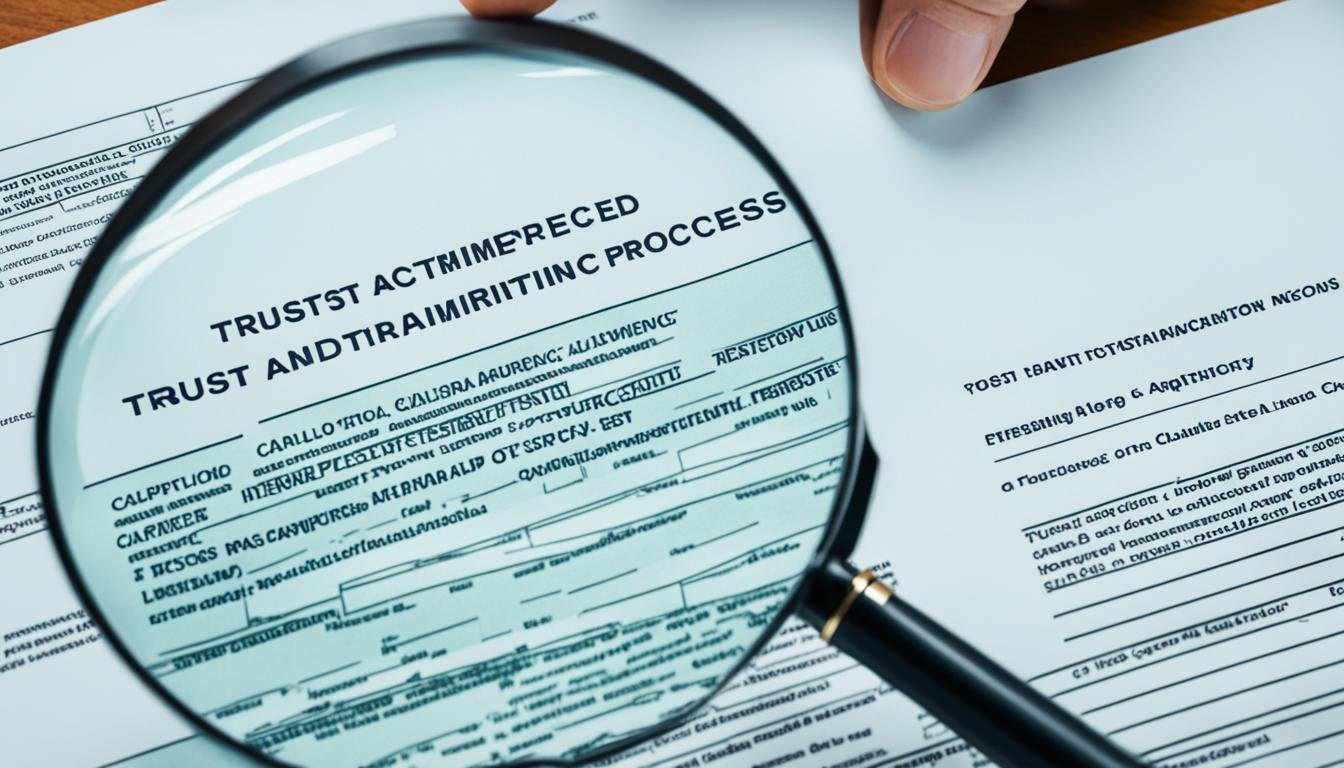Did you know that California’s Probate Code 16040 requires trustees to act with care and skill when managing a trust1? This is just one of the many legal rules trustees in California must follow. It’s important for both trustees and beneficiaries to understand trust administration well. This ensures the process goes smoothly and efficiently.
This guide will cover the main steps and best practices for trust administration in California. It will use expert advice to help you, whether you’re a trustee or a beneficiary. You’ll learn about gathering important documents, meeting deadlines, and distributing assets to beneficiaries. This article is a must-read for anyone dealing with trust administration in California.
Key Takeaways
- Trustees in California must execute tasks with reasonable care, skill, and caution as per the Probate Code 160401
- Trustees must issue notices to all beneficiaries and heirs within 60 days of the grantor’s passing1
- A Medi-Cal Notice of Death and Notice of Death of Real Property Owner must be filed within 90 and 150 days, respectively1
- Trustees must inventory and value all trust assets, including property, investments, and artwork1
- California trusts must file annual tax returns and make estimated tax payments if necessary1
What is a Successor Trustee in California?
When the original trustor of a trust in California can’t manage it anymore or has passed away, a successor trustee takes over2. This person has a big job to do. They must manage the trust’s assets for the good of the beneficiaries. They must follow the trustor’s wishes as written in the trust3.
Defining the Role and Responsibilities
A successor trustee in California has many tasks. They need to find important documents, list valuable items, and pay off debts2. They often work with experts like real estate lawyers and financial advisors to help manage the trust2.
They must keep track of the trust’s money, record all transactions, and protect the trust’s assets2. It’s crucial to know what the assets are, their value, and where they are. This helps keep them safe from harm2. Successor trustees must act honestly and follow the trust’s rules to look out for the beneficiaries’ best interests3.
Handling a trust in California can be tough. That’s why successor trustees might want to get help from experts like those at Super Attorneys Of Irvine2. These lawyers can offer great advice and make sure the trustee follows California trust law and California trustee duties3.

“If a trustee or successor trustee needs help, they can get advice from a team of trust lawyers, CPAs, insurance agents, and financial advisors.”2
Knowing what a successor trustee does in California helps people understand trust administration better. It ensures the trustor’s wishes are respected23.
Trust Administration Process California: Key Steps
The administration process in California has key steps for successor trustees. They must gather important documents like the trust document, death certificate, and a list of trust assets4. It’s vital to follow California’s strict deadlines to avoid delays or legal issues5.
Gathering Documents and Meeting Deadlines
Successor trustees can get help from experts like estate planning attorneys and financial advisors4. They need to check the trust to know what the settlor wanted. They must also tell beneficiaries and heirs, list trust assets, pay taxes, and file forms4.
Seeking Professional Assistance
Trustees manage and invest trust assets until they’re given to the beneficiaries4. They secure the trust and will, get a Tax Identification Number from the IRS, and give trust accounts to beneficiaries4.
Reviewing Trust Provisions
Trustees keep the trust and will safe during administration4. They send legal notices to those who will get something from the trust4. Often, they open a trust bank account with the EIN and their name4.
Notifying Beneficiaries and Heirs
The trustee finds out who gets any retirement plans from the deceased4. They might appraise real property or prepare it for sale if they plan to sell it4. They file tax returns like form 1040 for the decedent and form 1041 for the trust’s taxes4.
Inventorying Assets, Paying Taxes, and Filing Forms
Trustees often open a trust bank account with the EIN and their name4. Giving trust accounts to beneficiaries and figuring out their main distributions is key4.
Managing and Investing Trust Assets
Many trustees in California hire an attorney for help with the trust4. It’s common to order ten death certificates for the person who has passed away4.

Legal Notifications and Documentation
When you manage a trust in California, it’s key to meet legal notice and document needs. As a successor trustee, you must tell all beneficiaries and heirs within 60 days after the settlor dies, as California Probate Code 16061.76 says. This starts a 120-day window for beneficiaries to challenge the trust6.
Notifying Beneficiaries and Creditors
You also need to tell known creditors about the trust6. Keeping detailed records of all notices, letters, and actions is crucial. This shows you’re following the trust administration process rules and helps solve any disputes7.
Obtaining Tax Identification Number and Certification
As a trustee, get a tax identification number (TIN) or Employer Identification Number (EIN) for the trust. Also, prepare a Certification of Trust that lists the trust’s main details7. This paperwork is key for handling the trust’s money matters and following California trust law.
Maintaining Comprehensive Records
It’s important to keep detailed records during the trust administration process. Include all notices, letters, and actions, like asset lists, tax forms, and money given to beneficiaries7. Good records help prove you’re following the law and can settle any disputes7.
Handling legal notices and documents for trust administration in California can be tough. But, with help from Super Attorneys Of Irvine at businesslawyersirvine.com, you can make it smoother and follow the rules67.
“Proper estate planning documents like Trust, Wills, Asset List, Death Certificate, and Tax Returns are essential for efficient trust administration.”
Asset Management and Valuation
As a successor trustee, managing and valuing the trust’s assets is key. You need to list all the assets, like real estate, investments, and personal items. Then, get professional appraisals to find out their value today8. It’s important to keep these assets safe and in good condition, just like when the trust was made9.
The trustee might also have to manage and invest the assets to make money or grow for the beneficiaries. It’s vital to manage and value these assets well. This keeps the settlor’s wishes and meets the trustee’s duties8.
Trustees often work with financial advisors to pick investment strategies that fit the trust’s goals and the beneficiaries’ needs10. Checking the trust’s performance and making sure it follows the law keeps it running smoothly8.
Good asset management and valuation are key for trustees in California. They make sure the trusts work as the settlor wanted and benefit the beneficiaries. Working with experienced Super Attorneys Of Irvine helps trustees handle asset management and meet their duties8910.
“Elijah Keyes holds the Certified Estate Planning Specialist designation, a unique recognition by the California State Bar Board of Legal Specialization. Keyes Law Group assists clients with various aspects of estate planning, including establishing living trusts, wealth planning, family transfers, dynasty trusts, conservatorships, special needs trusts, elder law medi-cal benefits and planning, trust administration, and probate.”
Conclusion
The trust administration process in California is complex. It involves legal rules, managing assets, and taking on fiduciary duties. As a successor trustee, you are key to making sure the trust’s wishes are followed. You also need to protect and distribute the trust’s assets as the trust says11.
Knowing the main steps is important. This includes getting documents, telling beneficiaries, listing assets, and handling investments. With this knowledge, you can do your job well as a trustee12. If you’re a successor trustee in California, getting help from estate planning lawyers like those at Super Attorneys Of Irvine can make things smoother and more efficient.
In California, trust administration has legal steps. These include starting probate within 30 days after the grantor dies, telling beneficiaries within 60 days, and filing important forms like the Medi-Cal Notice of Death and Notice of Death of Real Property Owner12. Good communication between trustees and beneficiaries is key for a successful trust closure11.
FAQ
What is the role of a successor trustee in California?
What are the key steps in the trust administration process in California?
What are the legal notification and documentation requirements for trust administration in California?
How should a successor trustee manage and value the trust’s assets in California?
When should a successor trustee in California seek professional assistance?
Source Links
- https://www.clearestate.com/en-us/blog/trust-administration-california
- https://www.calprobate.com/blog/what-does-a-successor-trustee-need-to-know/
- https://www.clearestate.com/en-us/blog/successor-trustee-california
- https://www.clarkallison.com/blog/california-trust-administration-checklist
- https://www.thelegacylawyers.com/blog/california-trust-administration-checklist/
- https://www.harrimanlaw.com/trust-administration/trustee-responsibilities/ca-trust-notification-requirements/
- https://www.cunninghamlegal.com/california-legal-services/trust-administration-law/
- https://mattiayousif.com/trust-administration-checklist-california/
- https://www.clarkallison.com/blog/california-trust-administration
- https://keyeslawgroup.com/practice-areas/trust-administration/
- https://www.aldavlaw.com/blog/how-to-close-a-trust-administration/
- https://wernerlawca.com/california-trust-administration-process/

